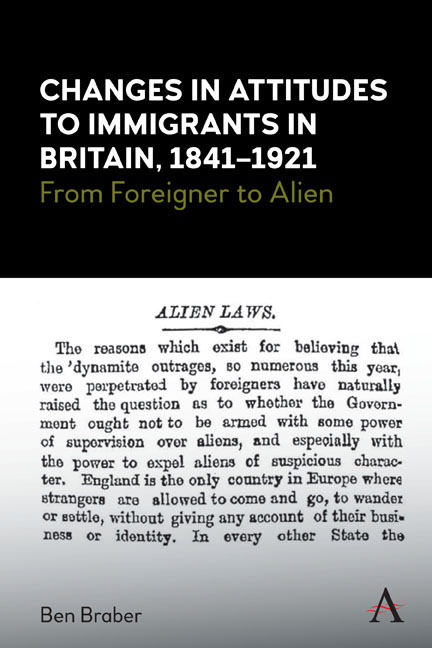1 - The Meanings of Alien
Published online by Cambridge University Press: 23 January 2021
Summary
The Oxford English Dictionary (OED ) records the first English use of the word alien in 1382, when the Wycliffite Bible translation mentioned an ‘alyen godde’. It is noted again by the OED in 1387, referring to an ‘alien lord’. In this sense the adjective alien came to mean belonging to another person, place or family, not of one's own, or from elsewhere and foreign. More specifically, in relation to a person, it adopted the sense of having been born in or owing allegiance to a foreign country, especially designating a foreigner who is not a naturalised citizen of the country where they are situated. ‘Alien’ acquired several connotations: of a foreign nature or character; strange, unfamiliar and different; and hostile and repugnant.
The OED is one of the main historical dictionaries of English. It traces the development of that language and provides a comprehensive reference guide. However, compilation of the dictionary did not begin until 1857, after the start of the period under review, 1841–1921, and it was not until 1884 that it was published as an ongoing project in separate instalments. Thus, the OED did not exist at the start of the reviewed period and its producers could have been influenced by anachronism and other factors at the time of their compilation, such as academic bias, which determined their choice or emphasis of word meanings. Therefore, the Historical Thesaurus of English better illustrates what the word alien meant for people during the entire period under review and what alternatives for this term were available to contemporary users of the language. The Historical Thesaurus charts the development of meaning in the vocabulary of English. It consists of recorded words from Anglo-Saxon times to the present day.
Noun
Alien appears in the Historical Thesaurus as a noun, adjective and verb. As a noun, it belongs to several categories, notably the subcategory ‘stranger and outsider’. This contains a few dozen words, which had similar meanings, and it indicates when records of their use were found. Apart from alien, recorded from 1330 to the present, words with the same meaning and relevant to the period 1841–1921 include stranger, from ca. 1385 to the present; barbarian, between 1549 and 1862; outsider, from 1800; and foreigner, between 1565 and 1700 and from 1855 to the present.
- Type
- Chapter
- Information
- Changes in Attitudes to Immigrants in Britain, 1841–1921From Foreigner to Alien, pp. 17 - 30Publisher: Anthem PressPrint publication year: 2020



